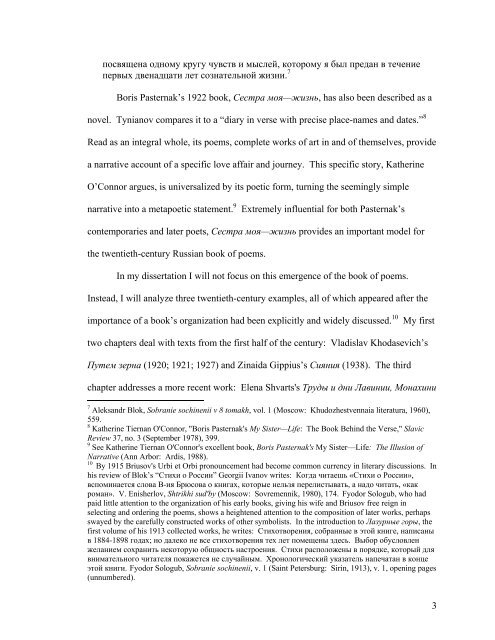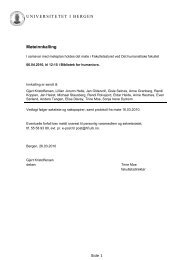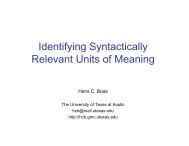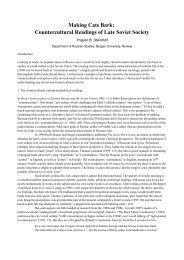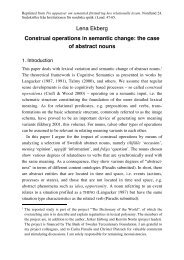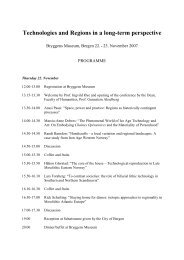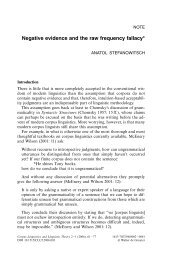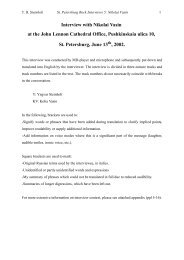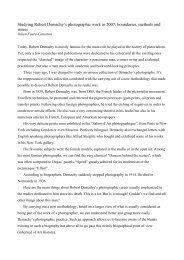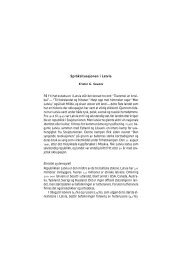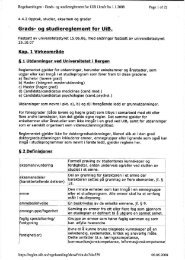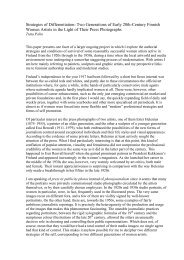THE BOOK OF POEMS IN TWENTIETH-CENTURY ... - TopReferat
THE BOOK OF POEMS IN TWENTIETH-CENTURY ... - TopReferat
THE BOOK OF POEMS IN TWENTIETH-CENTURY ... - TopReferat
You also want an ePaper? Increase the reach of your titles
YUMPU automatically turns print PDFs into web optimized ePapers that Google loves.
посвящена одному кругу чувств и мыслей, которому я был предан в течение<br />
первых двенадцати лет сознательной жизни. 7<br />
Boris Pasternak’s 1922 book, Сестра моя—жизнь, has also been described as a<br />
novel. Tynianov compares it to a “diary in verse with precise place-names and dates.” 8<br />
Read as an integral whole, its poems, complete works of art in and of themselves, provide<br />
a narrative account of a specific love affair and journey. This specific story, Katherine<br />
O’Connor argues, is universalized by its poetic form, turning the seemingly simple<br />
narrative into a metapoetic statement. 9<br />
Extremely influential for both Pasternak’s<br />
contemporaries and later poets, Сестра моя—жизнь provides an important model for<br />
the twentieth-century Russian book of poems.<br />
In my dissertation I will not focus on this emergence of the book of poems.<br />
Instead, I will analyze three twentieth-century examples, all of which appeared after the<br />
importance of a book’s organization had been explicitly and widely discussed. 10<br />
My first<br />
two chapters deal with texts from the first half of the century: Vladislav Khodasevich’s<br />
Путем зерна (1920; 1921; 1927) and Zinaida Gippius’s Сияния (1938). The third<br />
chapter addresses a more recent work: Elena Shvarts's Труды и дни Лавинии, Монахини<br />
7 Aleksandr Blok, Sobranie sochinenii v 8 tomakh, vol. 1 (Moscow: Khudozhestvennaia literatura, 1960),<br />
559.<br />
8 Katherine Tiernan O'Connor, "Boris Pasternak's My Sister—Life: The Book Behind the Verse," Slavic<br />
Review 37, no. 3 (September 1978), 399.<br />
9 See Katherine Tiernan O'Connor's excellent book, Boris Pasternak's My Sister—Life: The Illusion of<br />
Narrative (Ann Arbor: Ardis, 1988).<br />
10<br />
By 1915 Briusov's Urbi et Orbi pronouncement had become common currency in literary discussions. In<br />
his review of Blok’s “Стихи о России” Georgii Ivanov writes: Когда читаешь «Стихи о России»,<br />
вспоминается слова В-ия Брюсова о книгах, которые нельзя перелистывать, а надо читать, «как<br />
роман». V. Enisherlov, Shtrikhi sud'by (Moscow: Sovremennik, 1980), 174. Fyodor Sologub, who had<br />
paid little attention to the organization of his early books, giving his wife and Briusov free reign in<br />
selecting and ordering the poems, shows a heightened attention to the composition of later works, perhaps<br />
swayed by the carefully constructed works of other symbolists. In the introduction to Лазурные горы, the<br />
first volume of his 1913 collected works, he writes: Стихотворения, собранные в этой книге, написаны<br />
в 1884-1898 годах; но далеко не все стихотворения тех лет помещены здесь. Выбор обусловлен<br />
желанием сохранить некоторую общность настроения. Стихи расположены в порядке, который для<br />
внимательного читателя покажется не случайным. Хронологический указатель напечатан в конце<br />
этой книги. Fyodor Sologub, Sobranie sochinenii, v. 1 (Saint Petersburg: Sirin, 1913), v. 1, opening pages<br />
(unnumbered).<br />
3


